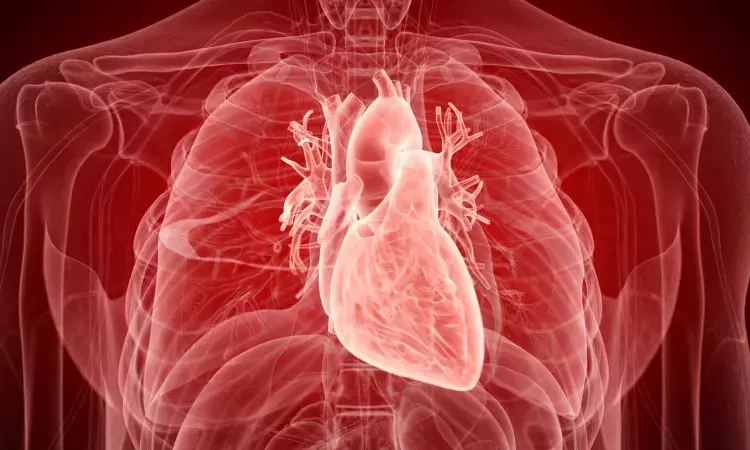- Home
- Medical news & Guidelines
- Anesthesiology
- Cardiology and CTVS
- Critical Care
- Dentistry
- Dermatology
- Diabetes and Endocrinology
- ENT
- Gastroenterology
- Medicine
- Nephrology
- Neurology
- Obstretics-Gynaecology
- Oncology
- Ophthalmology
- Orthopaedics
- Pediatrics-Neonatology
- Psychiatry
- Pulmonology
- Radiology
- Surgery
- Urology
- Laboratory Medicine
- Diet
- Nursing
- Paramedical
- Physiotherapy
- Health news
- Fact Check
- Bone Health Fact Check
- Brain Health Fact Check
- Cancer Related Fact Check
- Child Care Fact Check
- Dental and oral health fact check
- Diabetes and metabolic health fact check
- Diet and Nutrition Fact Check
- Eye and ENT Care Fact Check
- Fitness fact check
- Gut health fact check
- Heart health fact check
- Kidney health fact check
- Medical education fact check
- Men's health fact check
- Respiratory fact check
- Skin and hair care fact check
- Vaccine and Immunization fact check
- Women's health fact check
- AYUSH
- State News
- Andaman and Nicobar Islands
- Andhra Pradesh
- Arunachal Pradesh
- Assam
- Bihar
- Chandigarh
- Chattisgarh
- Dadra and Nagar Haveli
- Daman and Diu
- Delhi
- Goa
- Gujarat
- Haryana
- Himachal Pradesh
- Jammu & Kashmir
- Jharkhand
- Karnataka
- Kerala
- Ladakh
- Lakshadweep
- Madhya Pradesh
- Maharashtra
- Manipur
- Meghalaya
- Mizoram
- Nagaland
- Odisha
- Puducherry
- Punjab
- Rajasthan
- Sikkim
- Tamil Nadu
- Telangana
- Tripura
- Uttar Pradesh
- Uttrakhand
- West Bengal
- Medical Education
- Industry
American College of Cardiology issues concise clinical guidance on evaluation and management of cardiogenic shock

The American College of Cardiology (ACC) has issued its first Concise Clinical Guidance (CCG) to create more streamlined and efficient processes to implement best practices in patient care. This CCG focuses on evaluating and managing cardiogenic shock (CS), addressing important questions around clinical decision-making and providing actionable guidance for health care providers.
“ACC has a long history of developing clinical policy to complement clinical practice guidelines and to inform clinicians about areas where evidence is new and evolving or where randomized data is more limited. Despite this, numerous gaps persist in the evaluation and management of CS,” said Shashank S. Sinha, MD, MSc, FACC, writing committee chair and advanced heart failure and transplant cardiologist at the Inova Fairfax Medical Campus. Dr Sinha serves as Director, Cardiogenic Shock Program, Inova Health System; Medical Director of the Cardiac Intensive Care Unit, Cardiology; and Director of the Cardiovascular Critical Care Research Program. “Concise Clinical Guidance represents a key component of solution sets. They are highly focused, limited in scope, and aim to illustrate clinical decision-making processes using figures, tables, and checklists. They address patient populations who share certain characteristics, such as critically ill conditions like CS.”
CS is a life-threatening condition that occurs when the heart is unable to pump enough oxygen-rich blood to the body’s organs, resulting in hypotension (low blood pressure) and multi-organ damage or failure. CS has a high in-hospital mortality rate, ranging from 30 to 50%, and is one of the most common causes of cardiac intensive care admission.
The CCG addresses the importance of early recognition of CS for improving patient outcomes, providing comprehensive recommendations for its initial assessment, introducing a new mnemonic, SUSPECT CS, which includes laboratory markers along with clinical assessment for congestion-such as pulmonary edema, jugular venous distension and peripheral edema-and hypoperfusion.
“These markers should include a complete blood count, comprehensive metabolic panel, cardiac biomarkers including troponin and natriuretic peptides, lactic acid and arterial or venous blood gas,” Sinha said. “Once CS is suspected, a 12-lead electrocardiogram, chest radiography-and a transthoracic echocardiogram and/or point-of-care ultrasound, if available-should be completed as soon as possible.”
Other recommendations outlined in the CCG include invasive hemodynamic monitoring via pulmonary artery catheter for both the diagnosis and management of CS. It provides guidance on the medical management of CS with a focus on maintaining tissue perfusion to preserve organ performance. It also provides guidance on what to do when end-organ perfusion cannot be maintained with pharmacological interventions alone with escalation to temporary mechanical circulatory support.
For the first time, the CCG provides a one hour and 24-hour roadmap for clinicians on the evaluation and management of CS. In addition, it provides recommendations for the pharmacological and temporary mechanical circulatory support treatment for CS, highlights the need for ongoing patient monitoring, reassessment and follow-up, and provides guidance for the decision-making around a patient’s candidacy for advanced therapies, heart recovery or transfers to advanced heart failure centers. It also underscores the importance of interdisciplinary, team-based collaboration for the care of patients with CS.
“Community-based centers with limited resources should identify an on-site clinician to serve as their ‘shock champion’ as well as a center providing advanced heart failure therapies to partner with on complex CS cases,” Sinha said. “These partnerships are a key ingredient to successful strategies for managing this complex syndrome.”
Reference:
Shashank S. Sinha, David A. Morrow, Navin K. Kapur, Rachna Kataria, Robert O. Roswell, 2025 Concise Clinical Guidance: An ACC Expert Consensus Statement on the Evaluation and Management of Cardiogenic Shock: A Report of the American College of Cardiology Solution Set Oversight Committee, Journal of the American College of Cardiology, 2025, https://doi.org/10.1016/j.jacc.2025.02.018.
Dr Kamal Kant Kohli-MBBS, DTCD- a chest specialist with more than 30 years of practice and a flair for writing clinical articles, Dr Kamal Kant Kohli joined Medical Dialogues as a Chief Editor of Medical News. Besides writing articles, as an editor, he proofreads and verifies all the medical content published on Medical Dialogues including those coming from journals, studies,medical conferences,guidelines etc. Email: drkohli@medicaldialogues.in. Contact no. 011-43720751


